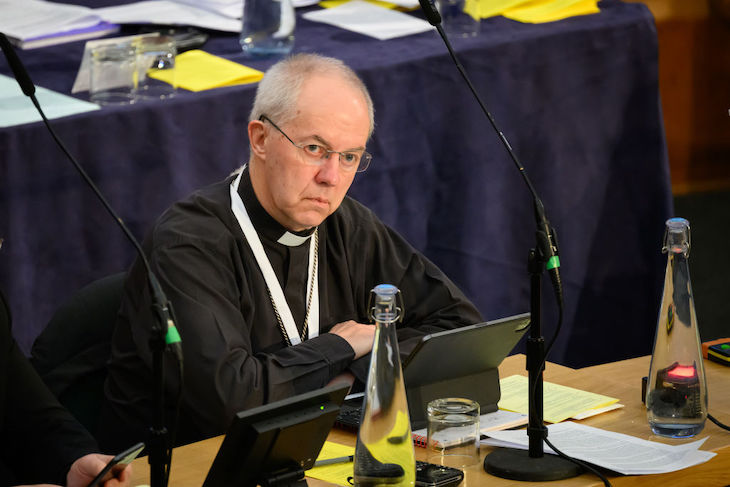After the hash the Church of England has made of the issue of same-sex marriage, a group of MPs led by long-standing churchman Ben Bradshaw has hatched a plan to pull the Anglican chestnuts out of the fire. His scheme is undoubtedly well-meaning: unfortunately, it is more likely to push them further in, to be reduced to ashes.
The current church fudge, prepared by the bishops after years of politely pious wrangling and approved by Synod last month, is easy enough to criticise. The teaching that marriage proper is between one man and one woman remains: the church will thus will have no part in marrying same-sex couples. However, it will now bless loving and committed same-sex unions and develop special prayers for them. The illogic is clear: if the justification for rejecting same-sex marriage is that any kind of sex outside opposite-sex marriage – same-sex or otherwise – is sinful, it hardly makes much sense to bless (i.e. condone) it in relationships short of marriage. Predictably, this Janus-faced compromise has satisfied no-one. Traditionalists see marriage being left as an empty shell; radicals see the plan as not going far enough.
Labour’s Ben Bradshaw has now tabled a ten-minute-rule bill in the Commons to sort things out. He proposes a deceptively simple measure that would override church self-governance in this respect and permit, but not require, clergy to marry same-sex couples in church.
This Janus-faced compromise has satisfied no-one
At first glance, this bill (which has no almost chance of success, but presages a more serious push) looks as liberal and innocuous as you can get. If a clergyman’s conscience is clear on the point, why not allow him to follow it, provided you avoid coercion? It is only when you look closer that you see that if enacted it would represent about the worst possible outcome for the Church.
To begin with, it is no compromise: to the contrary, it embodies a slam-dunk victory for the progressives. Even radicals like the Bishop of Oxford never seriously suggested forcing priests to marry same-sex couples against their will, limiting themselves to permitting it, which is precisely what the Bradshaw bill does. The point made by the conservatives, which rightly carried the day with the bishops, was that allowing same-sex marriage in church itself involved abandonment of the doctrine of marriage as being a mystical union between one man and one woman and replacing it with a vague criterion of committed sexual attraction. The idea of Parliament simply ignoring this point, and thus forcing on the church acceptance of a radical change in doctrine already rejected by its bishops, is not attractive.
Secondly, the reasons behind the Bradshaw initiative are not theological, but instead represent an unsavoury combination of secular political activism, petty managerialism and parochalism (in the worst sense).
The argument that the church has somehow spurned gay people and needs to become more inclusive, as if it was some snooty social club needing to be cured of outdated attitudes, is simply misguided. Gay people have always been welcomed in church in the same way as other sinners (that is, all of us). The real contention being advanced is that the church’s doctrine of sin must itself give way to contemporary secular equality doctrine, which is rather different, and leaves one wondering what the point of the Church of England, or for that matter any religion, is in the first place.
Take, too, the suggestion that accepting gay marriage is no big deal because it merely aligns the Church of England with churches in Scotland and Wales. This is equally flawed, reducing as it does deep religious doctrine to something more like the standardisation of weights and measures, an administrative tweak to be introduced by an enlightened and technocratic legislature.
Yet more repellent is an argument by no less than the ex-Tory MP and Second Church Commissioner Tony Baldry.
‘Why,’ he asked, ‘is the unity of the Church of England with, say, the Church of Uganda or the Church in South Sudan more important that the unity of the Church of England with its sister Churches in Scotland and Wales?’ Comment on this exercise in patrician contempt is superfluous.
Will an imposed decision to allow clergy to perform same sex marriages attract more members into the Church, as Ben Bradshaw might hope? Apart from the odd activist, it seems highly improbable. More likely it will simply quicken the haemorrhaging of worshippers (and possibly entire congregations) either to non-attendance, or to more conservative fringe churches such as the Free Church of England. At least there they will know that they are able to choose their doctrine without dictation from above.
In short, if Bradshaw and his friends succeed, the Church of England will become even more of a dreary, dwindling liberal sect with less and less connection to the people it is supposed to serve. For all his protestations that he sees disestablishment as a ‘nuclear option’ that no-one wants, this is likely to be the almost inevitable result. Perhaps, ironically, this might be the only good news to come out of this sorry saga. The history of established church government in the last 30 years has been a miserable tale of fudge and pusillanimity. Making the Anglican church stand on its own feet, governed by the votes of its worshippers, might well give it the shock it needs. Here’s to hoping, at least.






Comments